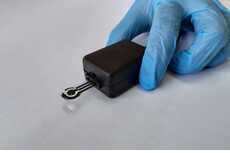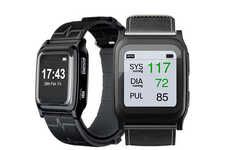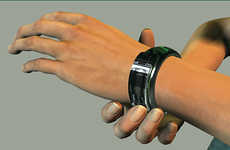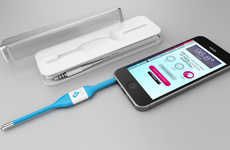
Loris Bottello's Medical Bracelet Concept Tracks Instances of Chronic Pain
Laura McQuarrie — May 1, 2014 — Lifestyle
References: lorisbottello.it
'Pinch' is a concept medical bracelet for chronic pain management by Loris Bottello that helps patients measure pain levels throughout the day. In addition to being able to manually input information, Pinch is designed to collect other data like the wearer's pulse, consumption of medication, physical activity and sleep levels.
Pinch is conveniently worn as a watch and to register an instance of pain, it has a simple touch interface on its face, which uses a series of colored dots to measure varying levels of discomfort. When Pinch is set upon its docking station, the recorded data is automatically sent to a storage system and from there, this information could be sent to caretakers or medical professionals for insight and analysis.
Pinch is conveniently worn as a watch and to register an instance of pain, it has a simple touch interface on its face, which uses a series of colored dots to measure varying levels of discomfort. When Pinch is set upon its docking station, the recorded data is automatically sent to a storage system and from there, this information could be sent to caretakers or medical professionals for insight and analysis.
Trend Themes
1. Chronic-pain-management - The trend of using wearable devices for chronic pain management presents opportunities for disruptive innovation in healthcare technology.
2. Data-collection-bracelets - The trend of using bracelets to collect and analyze personal health data opens up possibilities for disruptive innovation in the field of wearable technology.
3. Remote-monitoring-systems - The trend of remote monitoring via wearable devices allows for disruptive innovation in providing real-time health insights for caretakers and medical professionals.
Industry Implications
1. Healthcare-technology - The healthcare technology industry can benefit from disruptive innovation opportunities in developing advanced wearable devices for chronic pain management.
2. Wearable-technology - The wearable technology industry has the potential for disruptive innovation by creating bracelets that collect and analyze personal health data.
3. Telemedicine - The telemedicine industry can leverage the trend of remote monitoring via wearable devices to provide real-time health insights for improved patient care.
3.4
Score
Popularity
Activity
Freshness























